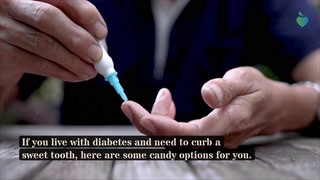Dark Chocolate May Lower Type 2 Diabetes Risk

Eating just a little bit of dark chocolate on a regular basis might help reduce your risk of developing type 2 diabetes, a new study finds.
The study included about 192,000 adults without type 2 diabetes who completed a series of food questionnaires detailing their eating habits over time — including how much and what type of chocolate they ate. Over a follow-up period of up to 34 years, roughly 19,000 people developed type 2 diabetes.
However, when researchers took a closer look at a subset of about 112,000 participants who provided more detailed information about what type of chocolate they ate, they found a reduction in diabetes risk only with dark chocolate. People who had at least five servings per week of dark chocolate were 21 percent less likely to develop type 2 diabetes. Milk chocolate, by contrast, wasn’t associated with any meaningful reduction in risk and was associated with weight gain.
What Candy Can People With Diabetes Eat And How Much Is Safe?

Next up video playing in 10 seconds
Why Dark Chocolate Is Good for You
Cocoa, which is more abundant in dark chocolate than milk varieties, is rich in plant compounds known as polyphenols. These have anti-inflammatory and antioxidant properties and play a role in helping the body to regulate blood sugar, says lead study author Binkai Liu, a nutrition researcher at the Harvard T.H. Chan School of Public Health.
“These polyphenol compounds likely play a key role in the observed reduction in type 2 diabetes risk,” Liu says. “There is no need to completely stop eating milk chocolate, but we suggest dark chocolate being a healthier option for chocolate lovers.”
The larger amount of cocoa and polyphenols in dark chocolate might also partially offset the negative health effects of sugar and saturated fat that are typically present in any kind of chocolate, says Toby Amidor, RD, CDN, a registered dietician and author of Health Shots, who wasn’t involved in the new study.
How Much Dark Chocolate Can I Eat Every Day?
Moderation is key even with dark chocolate. “Portions should be limited to no more than 1 ounce of dark chocolate per day,” Amidor says.
She adds, “If someone only likes milk chocolate, then they should only eat it in small amounts or sparingly — especially if they have a sweet tooth for it.”

Tom Gavin
Fact-Checker
Tom Gavin joined Everyday Health as copy chief in 2022 after a lengthy stint as a freelance copy editor. He has a bachelor's degree in psychology from College of the Holy Cross.
Prior to working for Everyday Health, he wrote, edited, copyedited, and fact-checked for books, magazines, and digital content covering a range of topics, including women's health, lifestyle, recipes, restaurant reviews, travel, and more. His clients have included Frommer's, Time-Life, and Google, among others.
He lives in Brooklyn, New York, where he likes to spend his time making music, fixing too-old electronics, and having fun with his family and the dog who has taken up residence in their home.

Lisa Rapaport
Author
- Liu B et al. Chocolate intake and risk of type 2 diabetes: prospective cohort studies. BMJ. December 4, 2024.